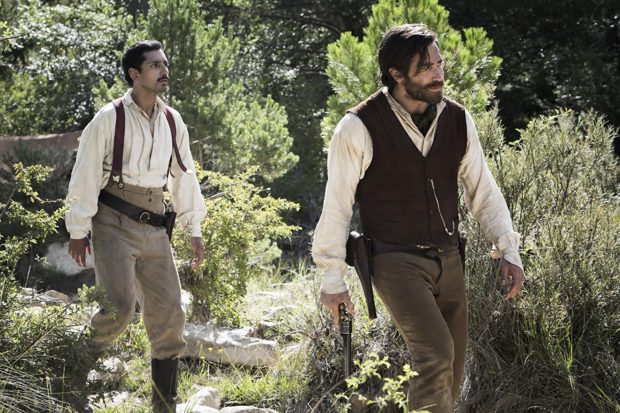 In his first English language film, Jacques Audiard gives us an interesting and off-beat take on the outlaw Western genre.
In his first English language film, Jacques Audiard gives us an interesting and off-beat take on the outlaw Western genre.
When I first saw the preview for a new Western film called The Sisters Brothers, I thought it was a comedy—first because of the title, in which the two brothers who are the main characters have the last name “Sisters,” which of course causes confusion, and because one of the brothers is played by John C. Reilly, who’s made a career from mostly comic roles. The preview used clips that sort of gave that impression. Well, there are some parts in the film that are quite funny, but no, The Sisters Brothers is not really a comedy, but a moody, harshly violent take on the Western outlaw genre, with occasional humorous elements. And that turns out to be, in my opinion, a good thing.
John C. Reilly and Joaquin Phoenix play Eli and Charlie Sisters, professional killers working for a powerful robber baron they call “The Commodore” in 1850s Oregon. The younger brother Charlie, played by Phoenix, is a reckless, hot-tempered and violent character who’s usually either drunk or hung over. Reilly’s Eli, the older brother, appears to be a moderating influence, more gentle in demeanor, and curious about other points of view. Their latest assignment from the Commodore is to meet up with a bounty hunter named John Morris, played by Jake Gyllenhaal, who has in his custody a man named Hermann Warm, a prospector played by Riz Ahmed, who supposedly stole something from the Commodore. After some surprising switches in allegiance, these four characters end up in the middle of the San Francisco Gold Rush. There’s quite a bit of graphic violence along the way in this story, but it’s not gratuitous, in my view—that is to say, the violence is not meant to be thrilling, but senseless and absurd.
Gyllenhaal sports a slight English accent playing Morris, who turns out to be a person of dignified character, while Ahmed’s mysterious Hermann Warm is an idealistic dreamer whose real reason for being pursued is only gradually revealed. Phoenix is his usual intense, concentrated self as Charlie, a man of dangerously unstable impulses. But the surprise star of the movie is John C. Reilly, whose amiable persona and comic timing get to expand in this film into a complex portrayal of a multi-faceted man whose words and actions tend to catch the audience off-guard. And the chemistry between him and Phoenix is great. They seem to have the intimacy, often expressed through petty quarreling, of real brothers.
With its quirky name and odd, formula-defying story, it’s no surprise that The Sisters Brothers is based on a book, Patrick DeWitt’s novel of the same title. The director is Jacques Audiard, a French filmmaker with excellent credits that include Read My Lips, A Prophet, and Dheepan. This is his first English-language film, and I suspect that Reilly, one of the producers, chose him because of his art film chops. Audiard adapted the novel along with his frequent collaborator Thomas Bidegain. One of the unusual and charming aspects of the film is that the characters talk like people who’ve read some books, not just “Yup” and “Howdy” and so forth, like you used to get with Westerns. There are some anachronisms in the mix—somehow I don’t think the phrases “end of story” or “what’s your problem” were current in 1850, but the film doesn’t really care and actually neither do I.
The movie has apparently not done as well at the box office as was hoped, which is a shame, and I would bet anything that it’s because it defies the conventional story forms, not only for Westerns, but for big budget movies in general. The main characters are not good guys, things don’t happen the way you might expect, and the resolution has an offbeat, emotionally warm quality that is unusual, but which I found interesting and refreshing. The Sisters Brothers takes you on a weird ride—instead of well-worn trails, it tends to bushwhack its way through its story, and this creates a unique pleasurable effect.

Artist and director Ulrike Ottinger presents her recollections of living and working in Paris in the 1960s. Paris Calligrammes: that’s not exactly a movie...

A new film from the West African nation of Ivory Coast presents an intriguing allegory about power and its misuse. Night of the Kings,...

A pub owner in a depressed town in northern England helps welcome Syrian refugees into the community. British director Ken Loach announced his retirement...